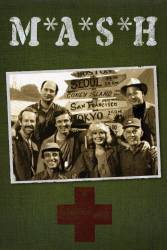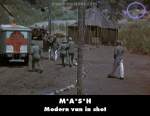Factual error: Another premature mention of Godzilla when Col. Blake announces that night's movie, "Godzilla and the Bobby Soxer". (00:01:57)
Factual error: Radar finds a rabbi on board USS Essex, but the film shown of the Essex isn't...it's the USS Yorktown CV-10.
Factual error: During the Hawkeye and Trapper argument in the tent, Trapper seems to wearing a 70s digital LED watch which didn't exist at the time of the Korean war.
Mad Dogs and Servicemen - S3-E13
Factual error: While Radar's lying in bed, Margaret reads a letter to him which was written by Wanda McCandless, and in the letter Wanda mentions that her favorite songs are "Pretty Thing..." by Bo Diddley, and "Oh, The Wayward Wind..." by Gogi Grant, but the problem is these songs were written and recorded in 1955 and 1956, years after the Korean War was already over in 1953.
Factual error: In the beginning, Hawkeye says that the patient was full of shrapnel from a claymore. M*A*S*H was set in the early 50's, and the M18 Claymore was only in the development stages in 1952, and not accepted and battle used until Vietnam in 1961.
Aid Station - S3-E19
Factual error: Mulcahy asks Hawkeye if he trusts God. Hawkeye replies "It says I should on all of my money." However, the phrase "IN GOD WE TRUST" didn't appear on American bills until 1957.
Factual error: Henry says that every Wednesday, his wife drives up Route 26 with some friends. US. Route 26 starts out in Nebraska and leads to Oregon. The closest thing that could be described as a "Route 26" would be the road leading from Princeton, IL to Dixon, IL which begins 85 miles from Bloomington. The writer probably meant Route 24, which passes about 20 miles north of Bloomington. (00:03:10)
Factual error: When reminiscing about Radar's appendectomy, Henry says it took a long time to find because it was behind his secum. The appendix is behind the secum in more than 50% of people, so this shouldn't have fooled a doctor of Henry's caliber. (00:09:00)
Factual error: As Hawkeye, Radar' and BJ stop to change the flat, Hawkeye uses a scissor jack to raise the Jeep. However, the scissor jack was not in use for this model of Jeep.
Factual error: When the can of beans explodes all over Hawkeye and Hotlips, they act as though the beans are cold. In fact the beans would have been at boiling temperature as the can overheated, causing it to explode, and the two would have been burned.
Factual error: In the hut with BJ, Zale, and The Moose, there's a Coleman 413E stove in the background. Trouble is, that this unit didn't appear until 1954, and the Armistice ending hostilities, ending the war, was signed July 27, 1953.
Factual error: After Radar asks Klinger when his home movies will be ready, Max answers, "Ready whenever you are, C.B." This is the specific punch line to a joke that relates to the actual filming of Cecil B. DeMille's 1956 movie The Ten Commandments, which wasn't released until after the Korean War. (00:16:30)
Factual error: When the South Korean Colonel and General are in the mess tent, their rank insignia are wrong. The insignia they are wearing are for the U.S. Army.
Suggested correction: They could have been Korean Augmentation To the United States Army (KATUSA) officers, who were Koreans drafted or volunteered into the US military to act as a liaison between Koreans and the US military. As such they wore US uniforms and rank.
Factual error: When the South Korean Colonel and General are in the Mess Tent with BJ, their rank insignia is wrong. The insignia the Colonel is wearing is for a U.S. Colonel, and the General's insignia would not be three stars in a horizontal line.
Factual error: Amongst Radar's comics are several not published until after the end of the Korean War, including issues of The Avengers and Spider Man.
Factual error: Nearing the end of the show, we are told that the Chinese have become involved in the conflict and have attacked with some 300,000 soldiers. This apparently refers to massive attacks by the Chinese starting on November 1, 1950. Although the numbers are correct, the US/UN forces were unaware of the numbers. As late as November 6, the Far East Command continued to insist that there were no more than 34,500 Chinese communist soldiers in country. http://www.history.army.mil/brochures/kw-chinter/chinter.htm.
The Abduction of Margaret Houlihan - S5-E6
Factual error: When Col. Flagg makes everybody close their eyes when he leaves, you hear the sound of glass shattering, but the window was a thick sheet of plastic.
Dear Sigmund - S5-E7
Factual error: Klinger says he would wear Hula Hoops(R) in his ears if it would get him a discharge. For several reasons, he is using a phrase that does not yet exist: 1) Show wise, Klinger will later try to convince Charles to invest in developing a new toy, a hoola hoop like plastic tube, being inspired by Korean children playing, and 2) plastic hoops which came to be called Hula Hoops were only introduced by Whamo in 1958. Setting episode dates is always difficult for MASH, but the Mash Olympics (inspired by the 52 Helsinki games) are still to come so we can say it must be 52. 3) The Hula Hoop trademark was only registered in 1962 to Whamo. No info. as to what name the hoops were marketed under prior to 62, but Klinger is using a term at probably ten years, at least 6 years, before it came into use. (00:04:00)






